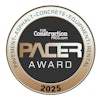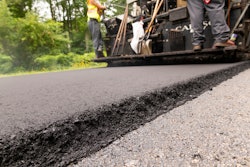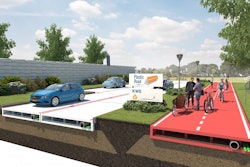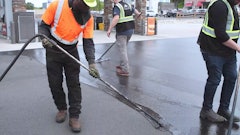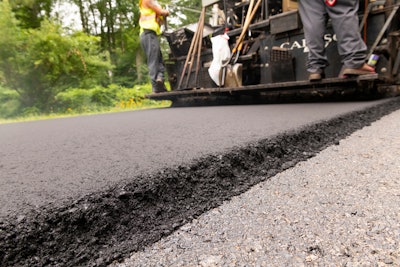
According to the Environmental Protection Agency, approximately 33 million tons of plastics were generated in 2014, with only less than 10 percent being recycled. The asphalt industry, being a leader in recycling and sustainability, has been looking for ways to use this waste materials in roadways. As with any experimental material in our roads, the proper testing needed to be done to ensure the process would result in long-lasting and high-performing roadways.
The Plastics Industry Association (PLASTICS) has worked to advance a research effort to explore using post-consumer recycled PE films as polymer additives in asphalt binder. In conjunction with the National Center for Asphalt Technology (NCAT), the team has developed a formulation using the recycled PE that is comparable in most performance areas to that of traditional, virgin polymers used in asphalt today.
Testing shows that a new asphalt formulation using recycled polyethylene (RPE) film recovered from retail locations could achieve many of the same benefits of traditional polymer-modified asphalt formulations
How it Works
There are two approaches of incorporating recycled plastics in asphalt pavements: the wet process and the dry process (NCAT, 2019).In the wet process, recycled plastics are added to the asphalt binder as polymer modifiers, where mechanical mixing is required to achieve a homogenous modified binder blend. In the dry process, recycled plastics are added directly to the mixture as aggregate replacement or mixture modifiers. The main obstacle to the implementation of the dry process is a concern of lack of consistency of the final produced mix.
However, the wet process also has limitations due to the poor storage stability of the plastic modified binders, where the recycled polymers tend to separate from the asphalt binder due to the difference in density and viscosity as well as the incompatibility between the two components.
While there have been several sections of roadways constructed using these materials and methods, research is needed to establish a better understanding of the impact of recycled plastics on the performance, especially durability and cracking resistance, of asphalt binders and mixtures.
Although this study demonstrated the feasibility and certain performance benefits of using RPE for asphalt modification, the scientific-based development of this concept is still at an early stage and needs further research. Those who conducted the study also say research efforts are needed on life-cycle cost analysis, life-cycle assessment and recyclability to ensure that adding RPE has no negative impact on the cost-effectiveness, environmental impact and recyclability of asphalt pavements or any unintended consequences on the health and safety of plant operators and construction crews.


